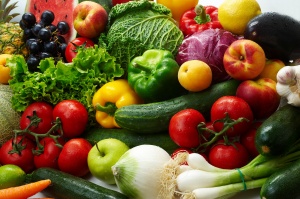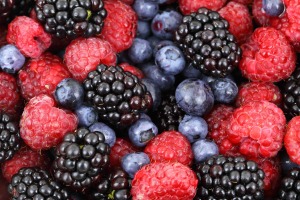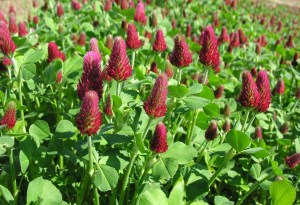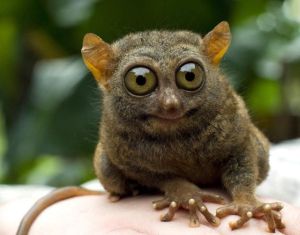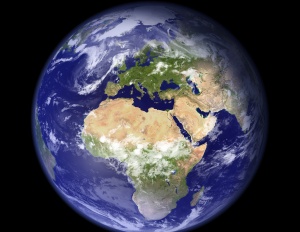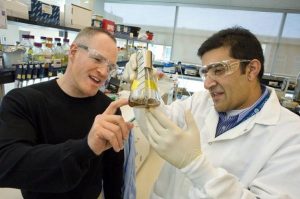Global food security is a huge problem and it’s only getting worse. Given increasing problems associated with global climate change, we are facing some of the biggest challenges of the 21st century: how do we optimize crop production in a way that causes the least damage to the natural environment while still managing to feed our growing world?
By 2050 we will need to feed 2 billion more people. The global population is predicted to increase to between 9 and 10 billion – this would be an increase of about 30%.
How are going to be able to do that without damaging the planet?
As the demand for food increases, combined with the fact that many nations are increasing becoming more prosperous, we are going to see not only a huge increase increase in population but an increase in the global demand for food. According to the UN’s Food and Agriculture Organization (FAO), it’s been estimated that global food demand will increase by roughly 70%.
Climate disruption and population growth are increasing pressures on food supply. Some of our staple foods, such as rice and wheat, are at risk of seeing rising costs as erratic weather conditions and disease leads to crop destruction.
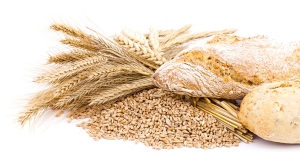
How important is wheat? at least for those not on a gluten-free diet?
Wheat provides about 20% of the calories consumed by humans. Take a minute to think about that.
Scientific advisors to the prime minister of Great Britain (UK’s Council for Science and Technology) have warned:
“If we fail to get more from the land in a sustainable way, the world must face the alternatives: people will go unfed, or more wilderness land will need to be brought under cultivation.”
When you considered both of these alarming increases and factor global climate change into the picture, we’ve got a seriously more challenging problem. Global climate change is already making farming more difficult and it’s only getting worse.
How are we going to produce more sustainable food while managing to minimize the agricultural impact on the environment?
This is an enormously complex problem, which requires a multi-faceted approach.
Here are just a few important policies and technologies we are going to have to embrace to feed our growing world while protecting our planet:
We also need to stop wasting so much food. An estimated one third of global food production is wasted, according to the UN’s Food and Agriculture Organization.
We need to stop polarizing ourselves and our communities by being closed-minded to anything that doesn’t fit into our perfect world view.
We need to strive for cultivating productive common ground between our communities, our scientists and our farmers. Whether we are indirecting in support of or personally involved in conventional or organic farming production and whether we really care about our individual communities or communities abroad, we all need to think about this problem. Both organic and conventional farming practices are going to have to re-evaluate and improve what our current definitions of our respective agricultural “status quo” to make changes that address both the growing need for food and protecting our environment – not just our profit margins (yes, both organic and conventional care about their profits).
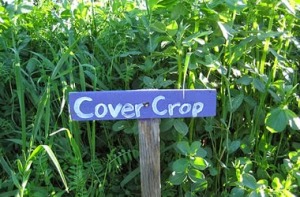
Organic farming techniques including cover crops (which add nutrients to the soil) and other practices that conserve water and improve soil quality. Just a couple examples of cover crops include fava beans, winter peas, crimson clover… These were some of the crops I planted for my father’s garden when I was growing up back in Oregon.
We are going to need to help our farmers better estimate when and where to plant, water and fertilize. In other words, we need to make big advances in precision farming which will require innovations in data science, information technology and the accessibility of both.
Can we rely solely on organic agriculture feed a world of nine billion people?
First of all, we need to stop turning discussions about how we are going to feed our growing planet, into discussion which are all about ourselves and our opinions which are designed to polarize the “organic” folks from the “conventional” agricultural folks. There are so many important issues to evaluate when critically thinking about balancing the benefits of organic and conventional agriculture. Their are pros and cons to both and the pros of each need to become synergistically implemented.
The answer is not going to be a simple ‘winner takes all’ approach for all possible farming situations. Instead of passionately polarizing ourselves into “natural” versus those evil “conventional” agricultural camps, we need to stop with the ideologically charged ‘organic versus conventional’ debate.
When thinking about both agricultural practices, the answer will includes positive advantages from both practices. We all need to become more open-minded; objectively and systematically evaluate the costs and benefits of both practices and find synergistic solutions.
OK, throwing in a picture of a tarsier…because oh, this is getting serious. We need to smile 🙂
We can achieve sustainable food security, but the answer lies not in the politicization of food, but in objective productive partnership between both groups and those scientists who have new agricultural innovations yet to be discovered.
The answer is that of an objective one; the ultimate goal isn’t to simply “win” a FaceBook or in person debate about “GMOs” versus “organic” whereby afterwards all we’ve achieved is reinforcing our obsession about how “proud” of ourselves we are in “speaking the truth” and “knowing what no one else knows…” This behavior should and needs to end.
If you really care about people and the planet then you have to start caring about finding solutions and supporting those solution, which can be practically implemented. There are more people on the planet than just YOU. And there are millions upon millions of people who NEED our help not our “desire to be popular at fad protests”. If you never try anything new or make a change in your thinking, things will never change.
A multi-faceted approach is required for practical food production and environmental sustainability. We are going to have to embrace various techniques—including conventional, organic, and ‘hybrid’ systems—to produce more food at affordable prices, ensuring farmer’s livelihoods, and to reduce the environmental costs involved in any form of agriculture.
And, yes we are going to need GM technologies. Farming is also the leading cause of deforestation in the tropics and one of the largest sources of greenhouse gas emissions. Not only are GM crops more efficient and overall lead to higher crop yields, one of the greatest benefits is the dramatic reduction of greenhouse gas production. Food production uses a significant quantity of arable land and natural resources, it’s been estimated that the net greenhouse gas benefits from use of low-tillage GMO crops equates to removing nearly 12 million cars from the road every year.
The use of GM plants not only increases crop yields but decreases the need for pesticide use, thereby preventing significant ecological damage to our environment. Contrary to popular belief, organic farming involves using OMRI-approved non-synthetic pesticides, one of the most common is the Bt toxin (a toxin made by a bacterium to keep insects away). Strangely enough, rotenone (a highly toxin compound) naturally found in the roots of some tropical plants is still listed as an OMRI-approved (organic approved) non-synthetic pesticide. If you don’t believe me, check it out for yourself: http://www.omri.org/simple-gml-search/results/rotenone
Organic farms spray Bt toxin on their plants resulting in a significantly larger amount of pesticide use than the crops which have been engineered to naturally produce the Bt toxins, albeit at a much lower level.
One of the greatest advantages to using GMOs, is for the development and production of more sustainable fuels: biofuels.
“Microbes such as the yeast we commonly use in baking bread and fermenting beer are now being engineered to produce the next generation of biofuels. Jay Keasling, a professor of chemical engineering at the University of California, Berkeley, is leading a team of scientists in an effort to manipulate the chemistry within bacteria so they will produce fuel from sugar.”
“Researchers in JBEI’s Fuels Synthesis Division are engineering new strains of yeast, the common single-cell organism used in baking bread and making beer, to more quickly and efficiently ferment the sugars derived from cellulosic biomass into biofuels. They are using the latest, most advanced tools of biotechnology including synthetic biology, to engineer new biochemical pathways for the production of fuel molecules and chemicals that are currently derived from petroleum. The goal is to produce fuels and other valuable chemical products from simple, inexpensive and renewable starting materials in a sustainable manner.”
Joint BioEnergy Institute (JBEI) Director Jay Keasling with Rajit Sapar in lab at JBEI with beaker of cellulose sludge.
Image Credit: JBEI//Jay Keasling
To learn more about what amazing biofuels scientists at JBEI are doing, please visit http://www.jbei.org/
livescience: http://www.livescience.com/7855-microbe-metabolism-harnessed-produce-fuel.html

